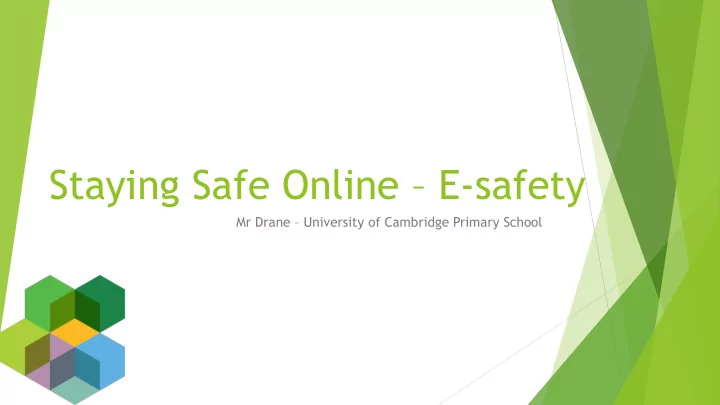

Staying Safe Online – E-safety Mr Drane – University of Cambridge Primary School
Today’s Workshop To talk about the benefits and risks of the modern online world – key issues To share with you how internet and e-safety is taught at UCPS To provide ideas for keeping your children safe online To answer any questions you may have.
True or False One in five 7 – 11 year olds has a social media profile
True or False Children spend half of their leisure time online
True or False One in ten children have been a victim of cyberbullying.
What are the issues? Conduct Content Contact Commercialism
Conduct Children may be at risk because of their own behaviour, for example, by sharing too much information Digital footprint Discuss with your child the importance of reporting inappropriate conversations, messages, images and behaviours and how this can be done. Kindness – anti-bullying message Empowering children to be responsible
Content Age-inappropriate or unreliable content can be available to children Some online content is not suitable for children and may be hurtful or harmful.
Content – Options Use technology in a shared room Guided Access/Restricted profiles NetAware Common Sense Media Find and make child-friendly sites favourites or bookmarks for them to use Use child-friendly search engines such as www.kidrex.org Filter-friendly Wi-Fi
Contact Children can be contacted by bullies or people who groom or seek to abuse them Privacy settings online may also allow you to customise the information that each friend is able to access. UK Safer Internet Center
Commercialism Advertising and marketing schemes Encourage your children to keep their personal information private Learn how to block both pop ups and spam emails Turn off in-app purchasing on devices where possible, and use a family email address when filling in online forms.
Our role as a school E-Safety delivery through the curriculum Safer Internet Day Empowerment Building children’s confidence in sharing concerns with adults Using images and personal information responsibly Relationships – PSHE Outside visitors Support for any concerns
How you can help Talk about the issues – encourage children to be confident in sharing their online concerns with you Explore the online world together Talk to your child about staying safe online Manage the software and tools your family use Agree rules about what’s ok and what’s not ShareAware – help your child think about who sees what they share Discuss privacy and location settings and why they are important Use the internet for positive learning and information opportunities
Questions?
Recommend
More recommend